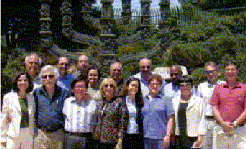
in the Faculty Fellowship Summer Institute in Israel
On June 16, 2008, 20 college professors from around the world embarked on the first ever Faculty Fellowship Summer Institute in Israel (FFSII), a two week academic program sponsored by JNF, Media Watch International and Scholars for Peace in the Middle East.
Created to foster a better understanding of cultures and religions for participants to take back to their respective campuses FFSII facilitated the exchange of thoughts and research between Israeli Faculty and their internationally renowned counterparts at seven major institutions in Israel. For many, it was their first time in Israel. Here’s what one had to say
Words cannot adequately capture the intensity of the experience and the transformative possibilities that the fellowship affords its participants” said New York University Professor Carol Tosone. “While I pride myself on being an open-minded person, I reluctantly admitted my David versus Goliath perspective on the Palestinian-Israeli conflict and my apprehension about traveling to Israel, Only direct travel to the country and an immersion into the Israeli perspective with all of its country and immersion into the Israeli perspective with all of its diverse and disparate voices can truly give a person an understanding of what Israeli citizens in general, and my colleagues in particular, are subjected to on a daily basis
“My introduction to Israel began at JFK airport with added security measures, a practice I would soon learn consumes every aspect of its citizens’ lives. Seeing the size and location of Israel on a map doesn’t convey how diminutive it is or how precarious is its relations to its Arab “neighbors”. I was astounded to travel from border to border to border in only a few hours, accompanied by an armed security guard – medic for protection. I was even more astounded to learn of the random shootings still taking place on Route 6 and the daily Qassam rockets targeting Sderot. ‘Why aren’t these incidents more prominent in the media?’ I asked several of the Jewish politicians and professors with whom we met. While they couldn’t offer a definitive answer, they did provide reasoned and balanced suggestions for sustained peace, and worked steadily to do so. The diversity of opinions was astounding as well, but the consistent thread was that working toward peace while being militarily responsive was the most viable option.
I was particularly impressed with the conditions under which my colleague in Sderot worked, Although her office was directly hit by a Qassam rocket (fortunately when she wasn’t there) it did not slow her determination of pace of productivity, Rather, it gave her the impetus to study shared trauma, the experience of helping professionals who are exposed to the same traumatic events as their clients. When one pf the FFSII participants asked if she was angry or wanted revenge, her response embodied all that makes Israel so special: ‘No, as a mother with a son serving in the military I wouldn’t want a Palestinian mother to know the pain pf losing a child, just as I wouldn’t want to lose my son.’
“I am humbled by her character and courage, and proud to be working with her on a research project comparing the experiences of clinicians exposed to chronic terrorism in Israel with those exposed to the 9/11 disaster in New York. I am also proud to call her a friend, someone whose safety I worry about on that dot on the map.”
(After returning from Israel the professors have already begun to collaborate on projects in their respective fields and created plans to utilize their experiences.)



